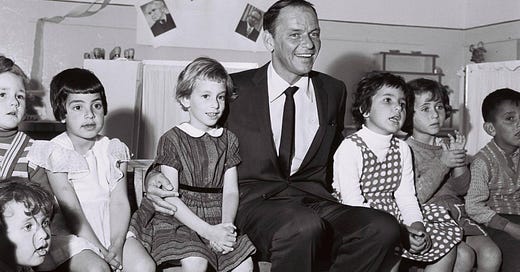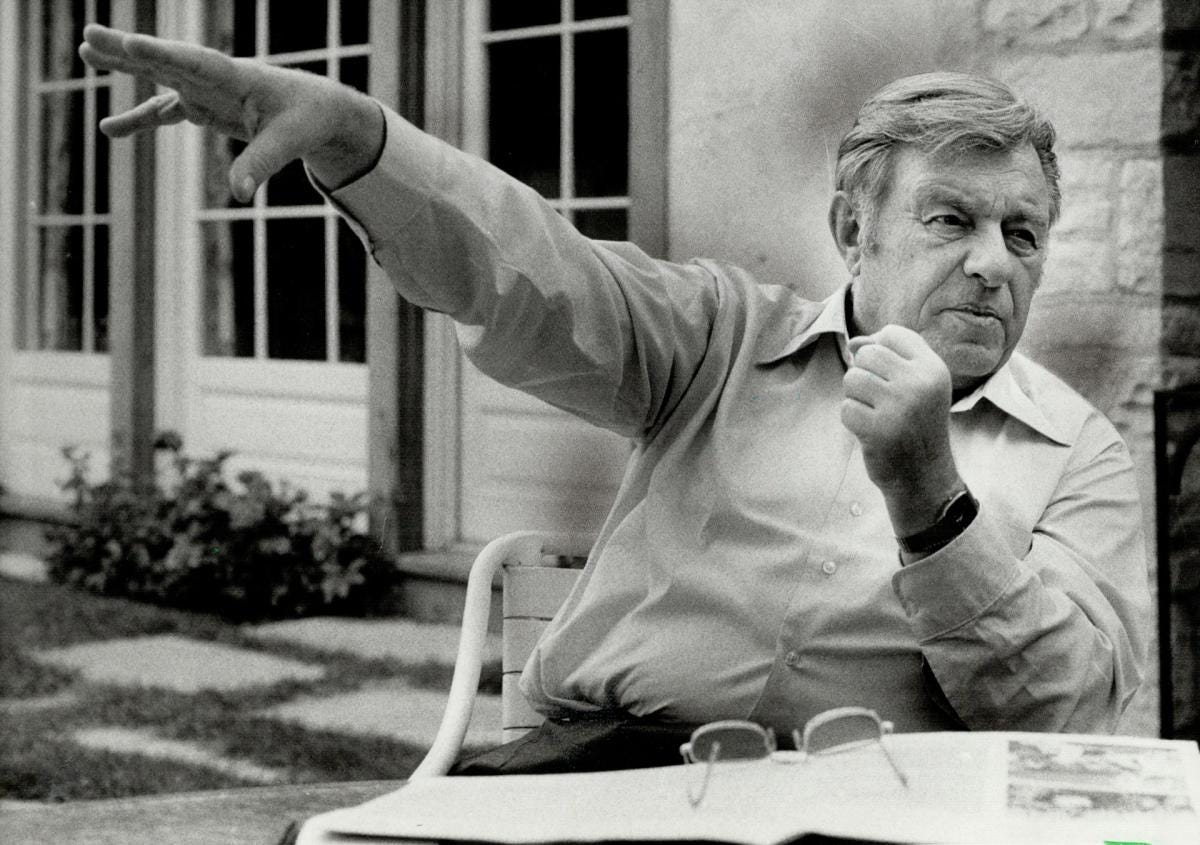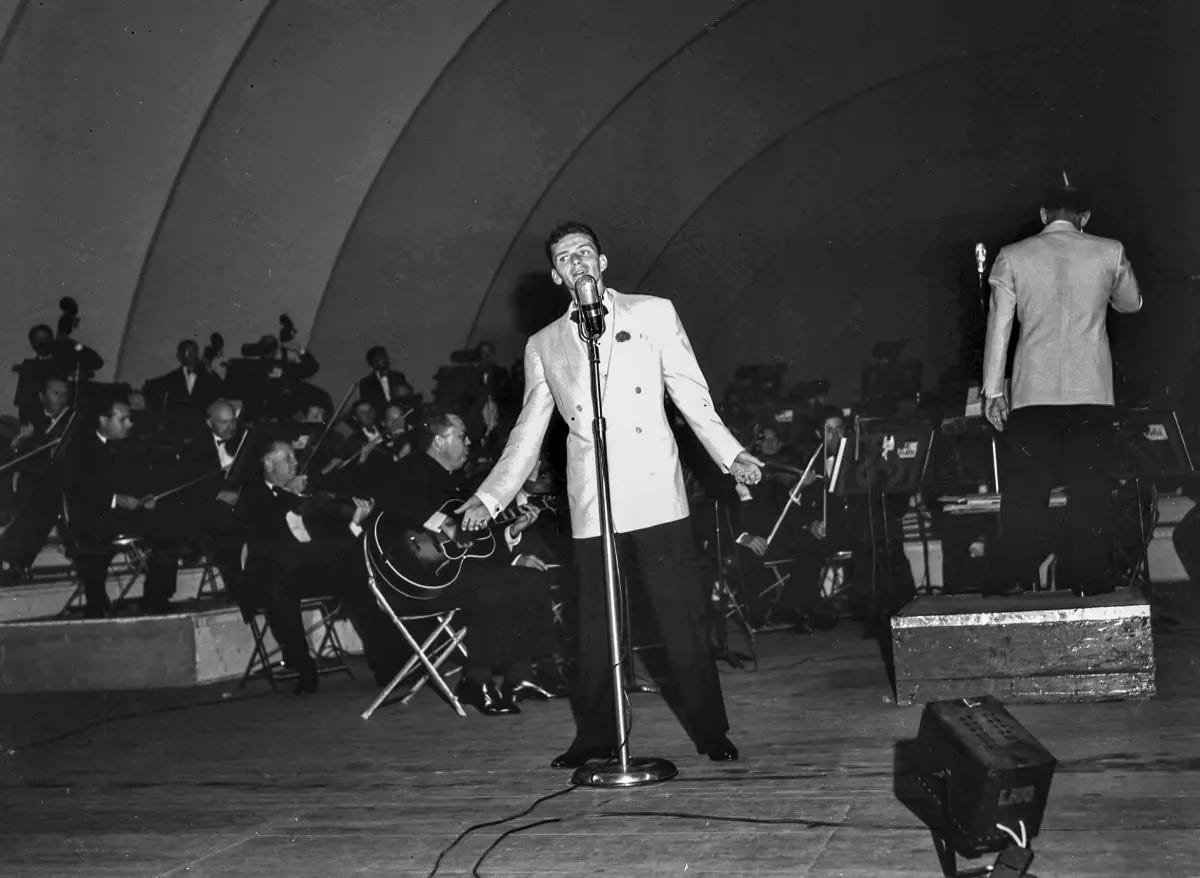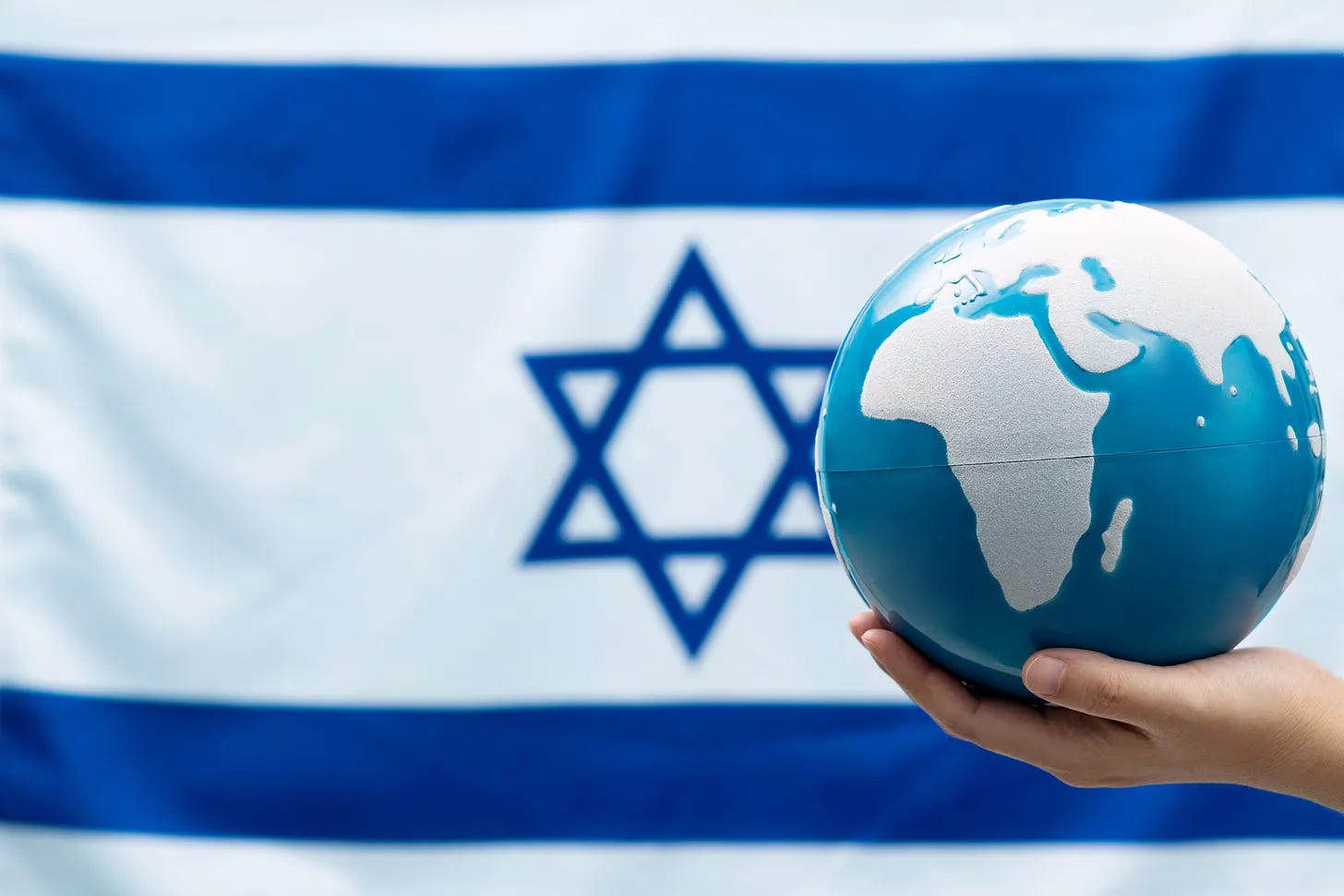Sinatra the Zionist — and a Secret Delivery
"It was the beginning of a young nation, and I wanted to help."
By Michael Golden
On a winter night in New York City 75 years ago, Frank Sinatra walked up to the bar at the Copacabana and started talking to a man named Teddy Kollek. At the time, he had no idea that Kollek was an operative of the Haganah — the Jewish paramilitary unit fighting in a war for independence 7,000 miles away — or that 12 hours later the two men would together be etched into history.
In 1948, the Copacabana was in the same building as the Hotel Fourteen, where Kollek’s crew had set up a makeshift headquarters. They’d been sent to the States by David Ben-Gurion to facilitate an arms shipment to the Haganah — but the U.S. arms embargo made it illegal.
Out of frustration, Kollek just sort of blurted out the story to Sinatra. He explained that in a nearby harbor, an Irish boat captain had a big shipment of munitions — and was ready to incur the risk — but he’d need $1 million in cash to set sail. Kollek had the money, but federal agents were closely surveilling all of his men due to the embargo. He was stymied. He kept talking. Sinatra listened.
Years later, Kollek told the rest of the story:
“In the early hours of the following morning, I walked out the front door of the building with a satchel, and the Feds followed me. Out the back door went Frank Sinatra, carrying a paper bag filled with cash. He went down to the pier, handed it over, and watched the ship sail.”
The arms were delivered. The Haganah was folded into a newly created Israel Defense Forces that won Israel’s Independence. And Teddy Kollek became the longest serving Mayor of Jerusalem, from 1965-1993.
Many years later, Sinatra’s daughter Tina asked her dad why he did it. “The Chairman” answered rather matter-of-factly:
“It was the beginning of a young nation. I wanted to help.”
The truth is that Sinatra had been supporting the Jewish People and the establishment of the State of Israel long before 1948 — and he would continue to do so for the rest of his life.
In 1943, he went on the national tour, “We Will Never Die,” to draw attention to the Holocaust. Two years later, he starred in an Oscar-winning film short, “The House I Live In,” centering around a Jewish boy experiencing anti-Semitism.
In 1947, Sinatra performed and spoke in front of a rally of 20,000 at the Hollywood Bowl to support the establishment of the State of Israel. He would go on to raise millions of dollars in pledges for Israeli bonds, as well as throwing his own money into the cause. He raised another $1 million to construct a student center at Hebrew University in Jerusalem.
The list is long, but perhaps his most poignant gesture was the charitable tour he went on across Israel in 1962 — turning over all of the proceeds to build the International Youth Center in Nazareth. Sinatra was so inspired by the experience that he commissioned a 22-minute film to capture it all. Years later, his longtime assistant, George Jacobs, described it this way:
“Here was a whole country of underdogs and survivors, the people Sinatra respected most, people like himself who had beaten the odds. Israel was the only place on the whole tour where Mr. S took a real interest in the country as anything other than a concert stop. He wanted to see everything, and Israel rolled out the red carpet.”
As odd as it may sound, Frank Sinatra was the very definition of a Zionist — and an incredibly effective one!
I’ve read a lot about Sinatra’s life over the years, but only recently did I come across this story about the secret cash delivery. I found it fascinating, and during these terribly tense hours where we’re watching Israel having to defend itself once more against murderous terrorists, it also came as a welcome distraction.
That said, I found Sinatra’s “I wanted to help” answer to Tina a bit unsatisfying. Beyond the Kollek caper, I wondered why this lifelong Catholic boy would advocate so forcefully over 60 years for the State of Israel and the Jewish People. Why so publicly? Why so consistently? So I read some more…
You could make the case that it began in childhood, when little Frank was often taken care of by his Jewish neighbor, “Missus Golden.” He learned Yiddish from her, and she actually bought him a mezuzah that he cherished for years. After the singer earned a few bucks, he purchased a quarter of a million dollars in Israeli bonds for his nanny.
Or you might conclude that it was because Sinatra had already made many Jewish friends early into his career. He’d even insisted that his friend “Manie” Sacks be godfather at his son’s baptism. When the priest disallowed it, Sinatra took Frank Jr. — and Manie — to another church.
I found many stories like this about Sinatra, and I’m sure these experiences bred some degree of allegiance to his Jewish friends. But ultimately, I think the personal motivation for his actions ran deeper.
Sinatra grew up a skinny Italian kid in the 1920s. By his own admission, he took a ton of crap, including being called “little dago” by other kids and getting showered with rocks. That early sting of discrimination taught him a lesson about fighting back — and it also instilled in him a feeling of empathy and common cause with other minorities:
“When I was a kid and somebody called me a ‘dirty little Guinea,’ there was only one thing to do – break his head… Let anybody yell wop or Jew or nigger around us, we taught him not to do it again.”
Sinatra despised bigots and the things they said and did. He was in his early 30s when he made that film of his 1962 tour through Israel. In one of the scenes, we see him attending a parade to celebrate Independence Day, and in his narration we hear him say:
“Israel is geared for growth. Its restless people must clear away the neglect of centuries so that a healthy, modern people can flourish in a modern setting… Only 14 years old on this Independence Day, Israel has a long way to go. In the spirit of human brotherhood, we Americans salute the pioneers of Israel, steadfast and strong.”
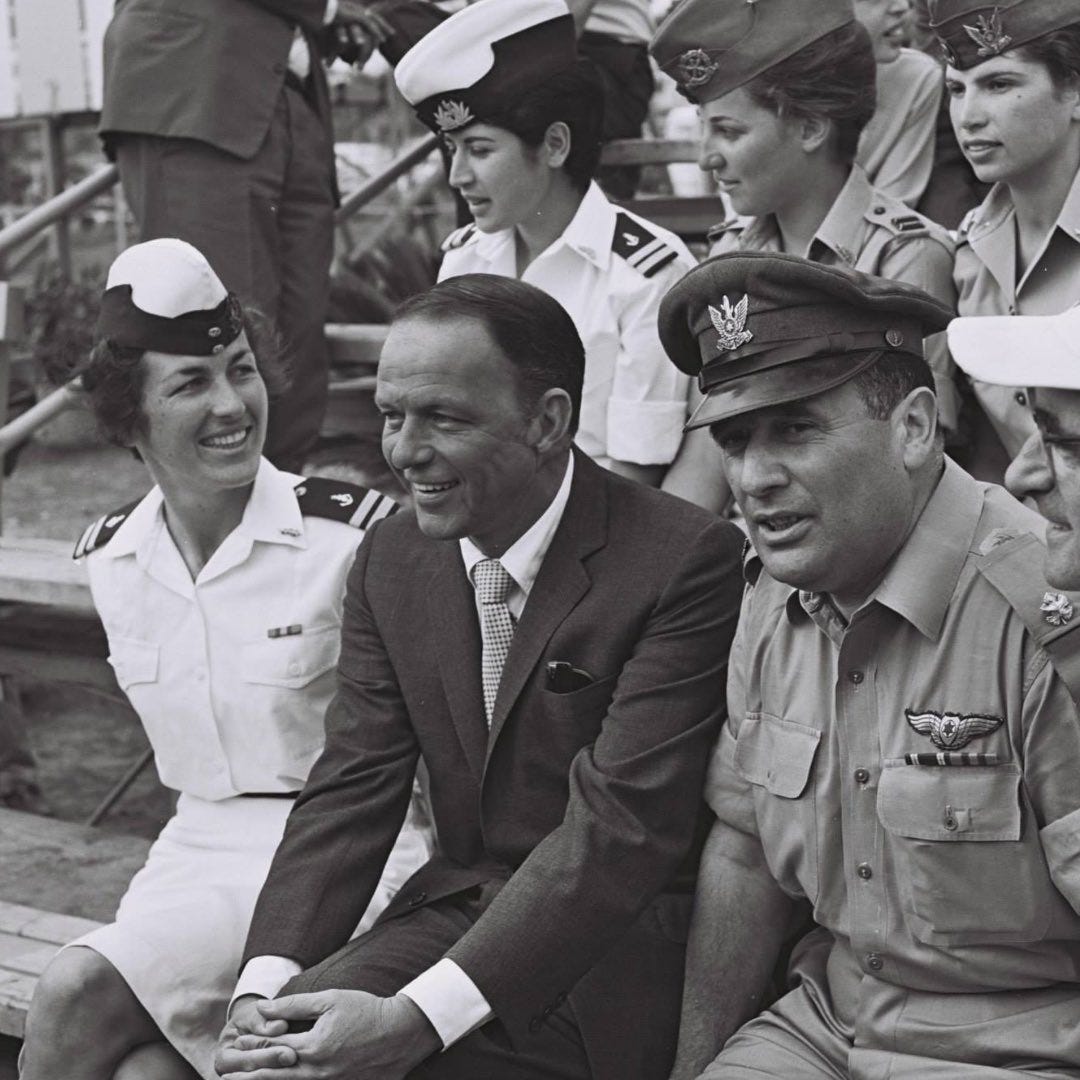
Looking at the growth of Israel 50 years after that hopeful remark — and especially against the backdrop of history — it is astonishing to see just how far this country has come. Israelis have made it so (while also making more than a few non-Jewish Zionist friends along the way!).
Yet no once-in-a-century performer — or president for that matter — is influential enough to eliminate the millennia-old scourge of anti-Semitism. Senseless evil driven by senseless anger that never seems to leave this world.
If history is any guide, Israelis and Jews the world over will always have to defend themselves against hate-filled extremism. October 7 was a fresh and indescribably painful reminder of that fact.
Michael Golden is the Editor-in-Chief of JEWDICIOUS.
**If you are interested in having nuggets of Jewish History like this one delivered to you daily — check out our partner publication: Dust and Stars!
Free subscriptions to JEWDICIOUS are available until the end of 2023!
From decoding politics to the cutting edge of wellness to the human angle on sports to parenting and personal relationships — plus our unsparing take on what’s happening in the Jewish world — the canvas at JEWDICIOUS is limitless. Our 18 scribes share one overarching goal: To present you with new ideas and slices of life that will hit your head or touch your heart!


